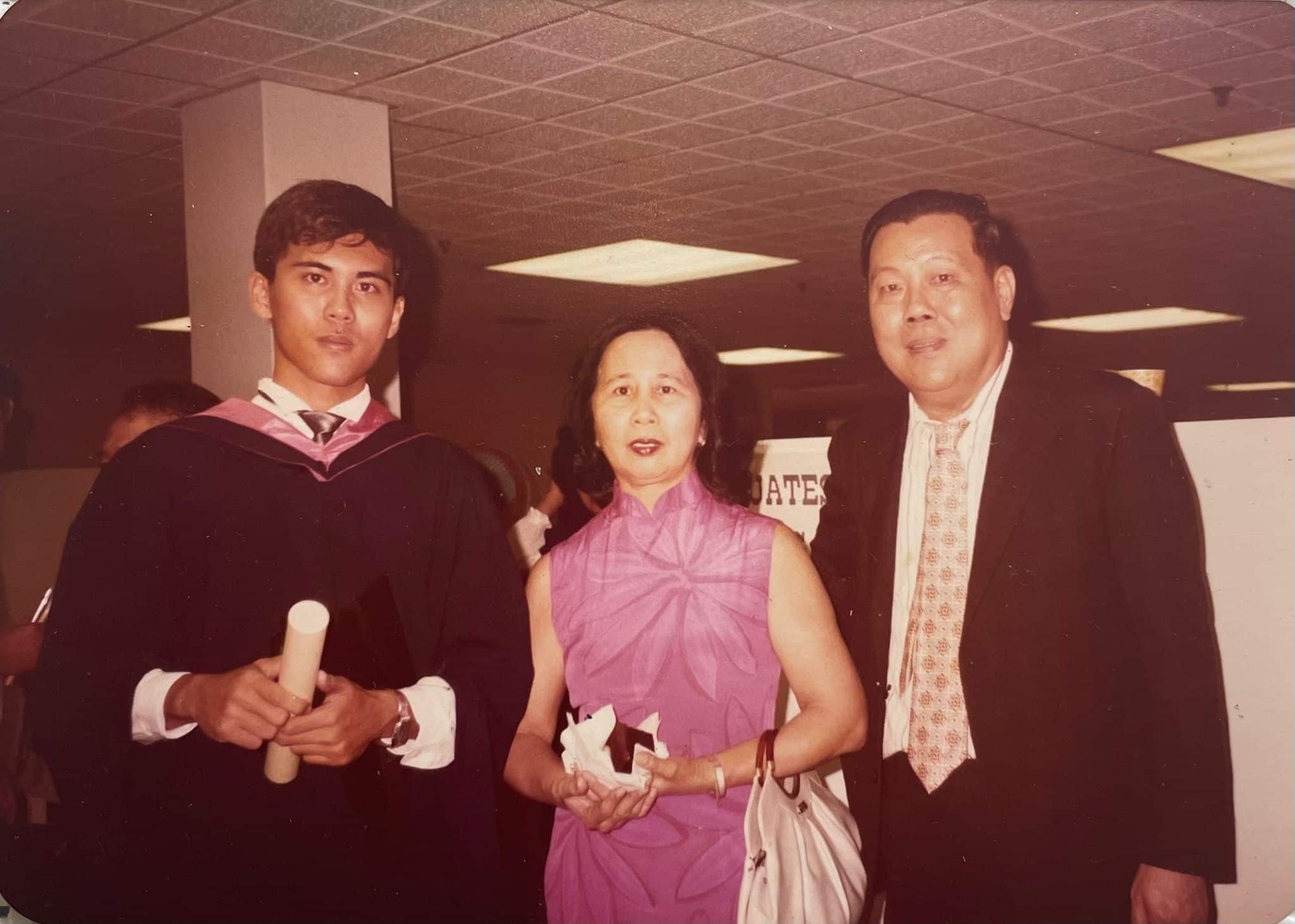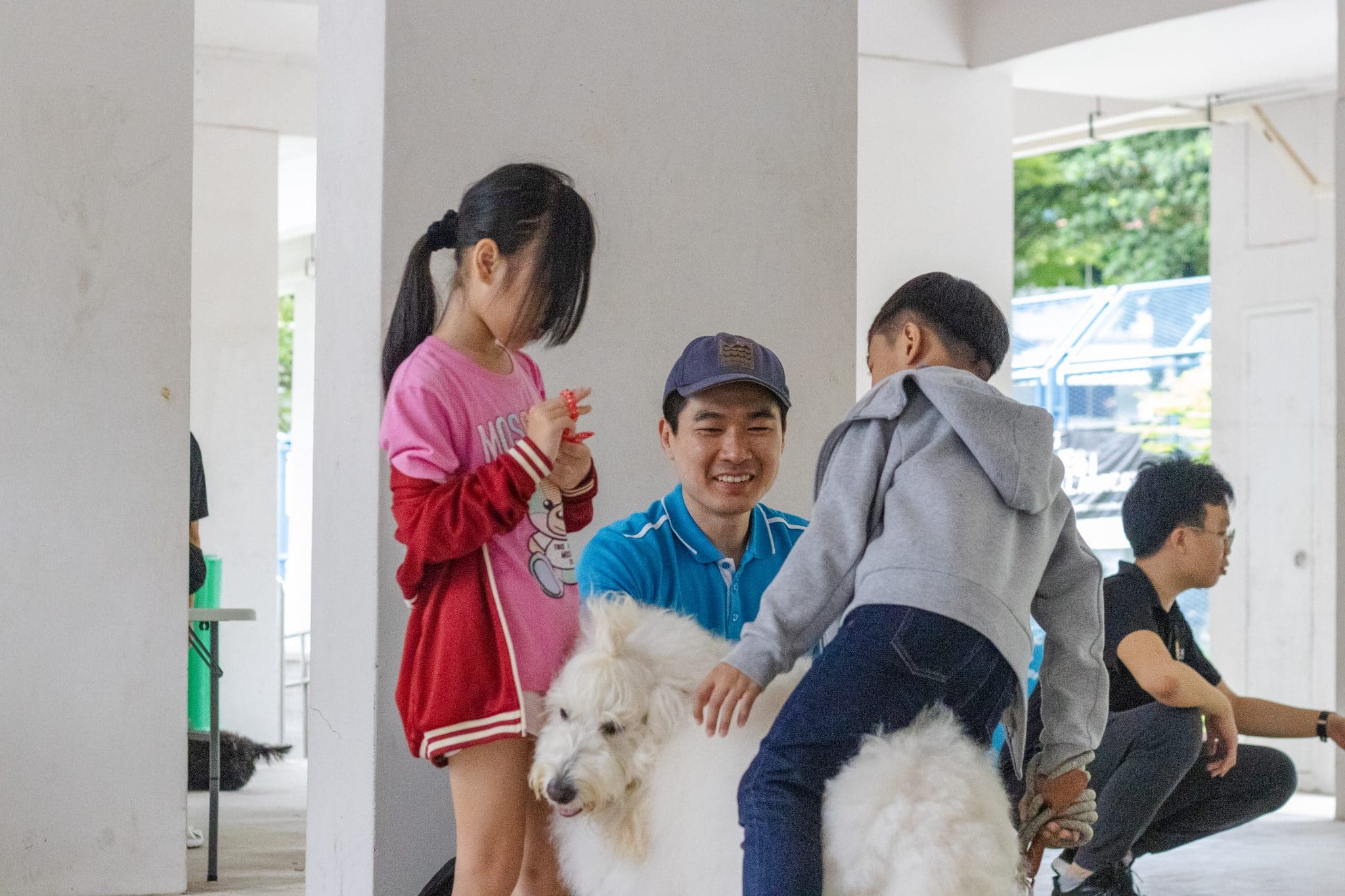“How to rest? This is a calling, not a job”: Founders of Singapore’s only all-women halfway house on the past 30 years
by Gracia Lee // July 17, 2020, 12:19 am
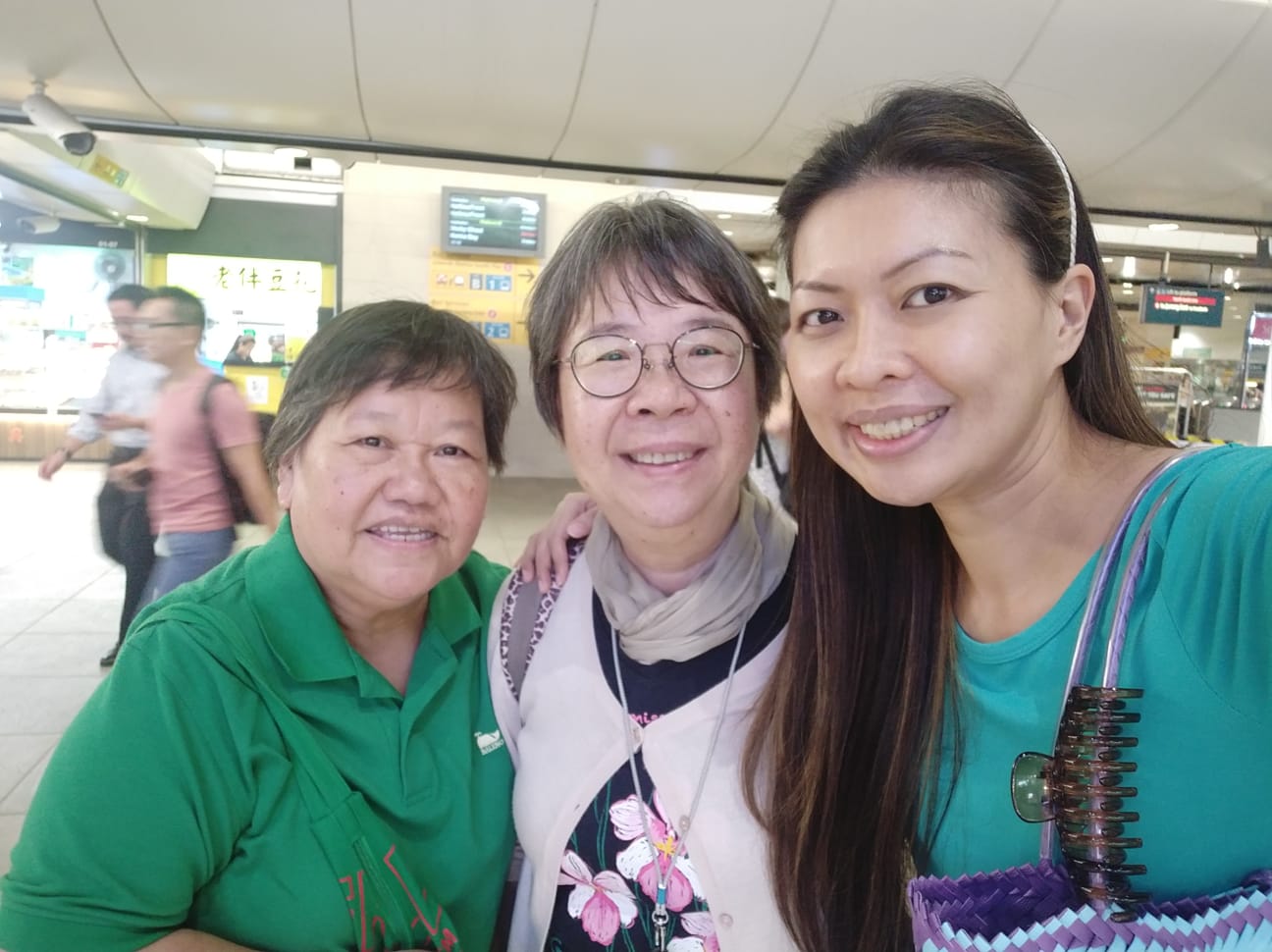
Founders of The Turning Point, Khew Swee Ling (left) and Florence Ng (middle), with a former resident Carol Wee, who overcame her addiction at the halfway house and is now giving her life to prison ministry as well. All photos courtesy of Florence Ng.
If you had told Florence Ng and Khew Swee Ling in 1990 that their ministry to women drug addicts would one day cross its 30-year mark, they would not have believed it.
When they first began, the founders of The Turning Point – Singapore’s only all-women halfway house – had struggled to even imagine lasting for five years.
In the 1970s and 1980s, there had been at least three attempts by capable women to set up a female halfway house. Yet each time the work had fizzled out and folded in just two to three years.
“We are not impressive people; we are just bridges connecting people to God.”
Fresh out of Bible school with zero experience in drug rehabilitation work, Ng and Khew were discouraged by some to make another attempt.
But both had prayed about it for months and felt convicted by the Lord to revive the work despite the odds. It was this call that they would spend close to the rest of their lives heeding, pressing on even in the trenches of difficulty.
By the grace of God, The Turning Point has lived up to its name for many who have passed through its doors. Three decades on, a ripple effect has also surfaced as some former residents use their transformed lives to inspire and encourage others like them.
“Honestly, our work is entirely the work of God,” said Khew, 67, who retired in 2017. “We are just His tools, doing the work that He wants us to do. We are not impressive people; we are just bridges connecting people to God.”
A formidable goal
Ng and Khew set up The Turning Point in July 1990, despite discouraging feedback from former halfway house operators who had found that institutional living simply did not work for women, said Ng, who was director of the home from 2001 to 2010.
Women struggled more with institutional living than men, she explained, as having a private space is important to them. Being more relational beings, women also found it more difficult to be away from their loved ones, she added.
“They’re worried about their children and want to be with them. They also want to be with their boyfriends or husbands and are worried that their partners will run away if they’re not there.”
“I felt these girls needed to know their Father God like I did.”
As a result, many women did not stay at the halfway houses long enough for any lasting change to take place, making the work unpredictable and difficult to sustain, said Ng, 66, who retired in 2010.
However, Ng and Khew both felt a keen sense of calling toward the work and took a decided step of faith.
“We said, by hook or by crook, let’s do it for five years and then after that ask the Lord whether we should carry on or not,” Ng recalled.
It was a formidable goal, given that previous operators had not lasted more than three years.
A growing burden
As predicted, the work was difficult. For the first few years, at their old rented bungalow on Meng Suan Road, the duo often saw women come and go within the span of a few days.
Some ran away days after promising to stay for a year. Others could not last through the withdrawals and demanded to leave. There were days that they had no clients in the home.
“When you hear their stories, you don’t see addiction just as a sin. You see it as a bondage.”
“It was difficult in these starting years because we were trying to serve while struggling to figure out where God wanted to bring this work,” Khew recalled.
But they persevered, even on the seemingly fruitless days. When they had no clients, they would go into the drug rehabilitation centre (DRC) to befriend the girls, hear their stories and do Bible study with them.
Every year, there are about 300 women in the DRC, which caters specifically to those who are caught abusing drugs.
“The prison was our marketplace,” said Ng. “We told them, when you come out, if you ever need help, you can come to us.”
It was at these visits that the burden for these women grew, she added. “When you hear their stories, you don’t see addiction just as a sin. You see it as a bondage that they’re in, and often it’s generational.”
Many of these women had absent fathers – something that Ng could empathise with, having grown up with a father who “never bothered with us”.
“This was something that pulled at my heartstrings,” Ng said, choking up with emotion. “I felt these girls needed to know their Father God like I did. The Lord wants to reach them.”
Pressing on
However, though the burden grew, the work did not get easier. After about two years, finances started to dry up and Ng and Khew grew uncertain if they wanted to continue.
“In fact we said, good. Let’s not send out anymore newsletters to churches. Then when the money stops coming in, we have a good reason to tell the board, bo lui ah (Hokkien for no money)!” Ng said candidly.
But soon after that, an anonymous cheque of $7,000 came in. “I checked with all the volunteers asking who had sent it, but everybody said ‘not me’. It must have been from the Lord telling us to just carry on,” said Ng.
And so they did faithfully, until five years as they had promised.
Just as they were evaluating whether or not to continue the work, the DRC came up with a new system to send drug offenders to halfway houses for their last six months of detention, to help with social reintegration and family reconciliation.
This meant that there would finally be a steady stream of clients – who could not run away as they were serving a mandatory prison sentence – for Ng and Khew to work with.
“In that case, we had no reason to close down,” said Ng. “We had to give it a try.”
Hope of Jesus
From that year in 1995, The Turning Point saw about 12 to 16 girls on average in the halfway house, where Ng and Khew lived with them.
“We were like family,” said Ng. “For example, we would do house cleaning with them. And if we had a very tough day, then we would bring them out together to eat and celebrate together.”
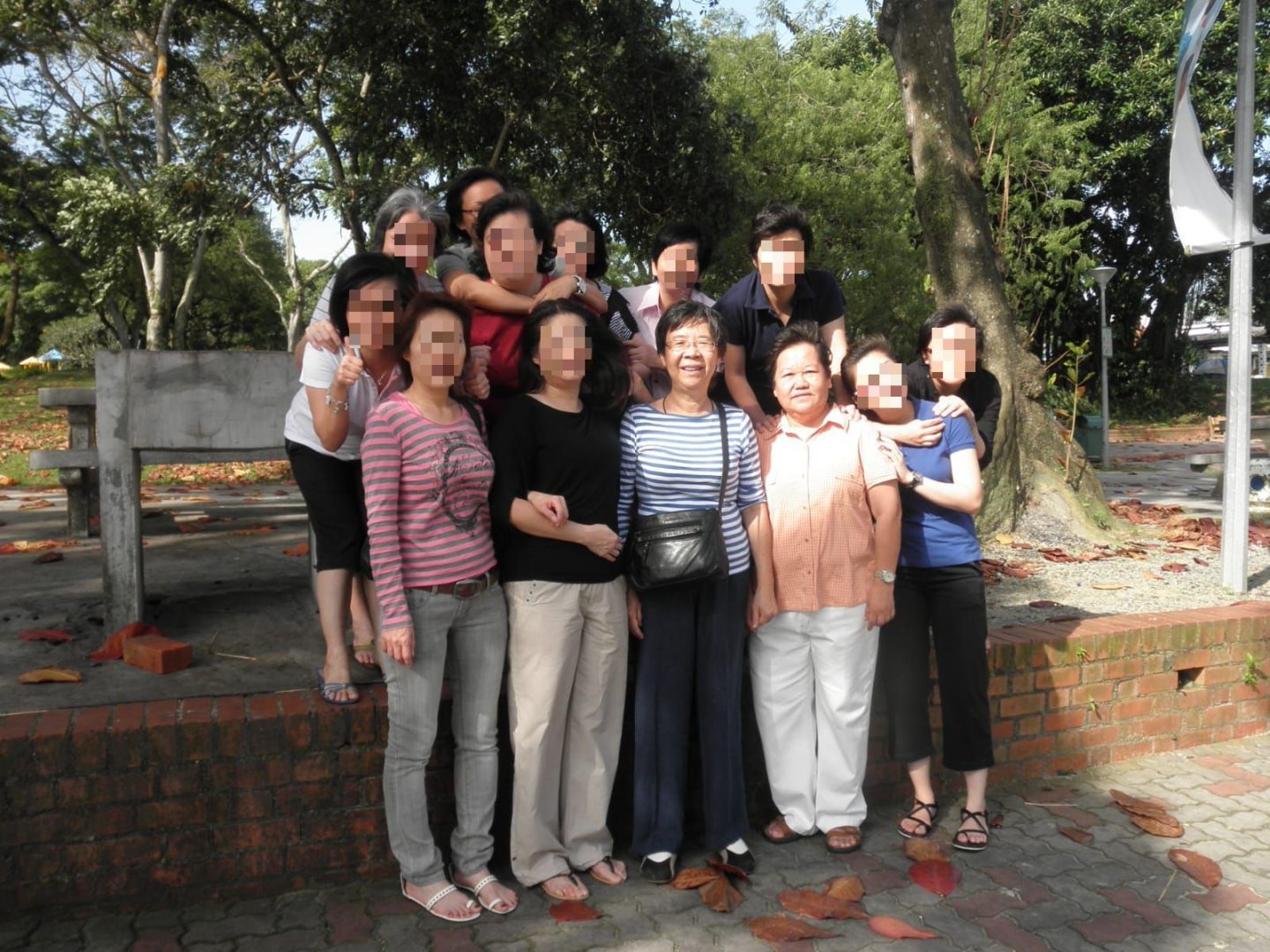
Ng (in blue stripes) and Khew (on Ng’s left) at an outing with residents of The Turning Point. “We were like family,” Ng said. Many of the home’s former residents regard Ng and Khew endearingly as their mothers or godmothers. Faces of the residents have been blurred to protect their identities.
The girls, who were there for between six to 18 months, had to abide by a routine that included doing household chores, attending courses on life skills and craftwork, and undergoing counselling.
Morning devotions and Bible studies were also part of the programme, as was going to church on Sundays.
“The goal was to give them the Giver of hope, Jesus himself.”
Khew said: “Our belief is that we have to lead them to believe in Jesus. We don’t expect them to change completely (overnight).
“We cannot do that, so we share the gospel of God in the midst of their battle, to allow His Word to greatly impact the life of a person who wants to change but doesn’t want to change at the same time.”
Ng added: “The goal was to give them the Giver of hope, Jesus himself. They may not understand it then, but at least they know that there is Someone who’s interested in helping them.”
Building a family
The work, however, was often challenging. They had to break up fights among residents, even threatening to call the police on them several times.
Once, a resident who was undergoing withdrawal symptoms put a kitchen knife to Ng’s throat and demanded for her to open the door and let her go.
“We could spend years helping one person and this person’s life might not really change.”
It was also common for the girls to be defiant and uncooperative, or antagonistic toward other girls who were being conscientious, said Ng.
“Some just wanted to leave the programme, especially those who were mandated,” she added.
Khew said: “It wasn’t easy to build a family relationship. Although they were very problematic, we still loved and cared for them, and tried to sympathise with them and understand their needs. It was this mindset that enabled us to continue serving for so many years.”
Their persistent love did pay off, though not always immediately.
“Usually, after the programme, they are remorseful,” said Ng, recalling the time a former resident, who had been rather rebellious, returned with a basket of flowers.
“She just put her hand through the gate and said, Sister Florence, I’m so sorry.
“That was just enough for me.”
However, it also quickly became clear that even with their best efforts, they could not help every woman who passed through their programme.
“We could spend years helping one person and this person’s life might not really change,” said Khew matter-of-factly.
Though many girls chose to believe in Jesus and got baptised during the programme, many fell away from the faith after they left. Ng estimates that only about 1 in 10 they have helped have continued to persevere in their faith.
Every year, they would also hear of at least one former resident who had committed suicide, Ng said.
“Those were the times that we had to come before the Lord and say, please help us to press on because we don’t want to see more and more of such cases,” she added.
Real friendship
While these seemingly futile moments often discouraged Ng and Khew in their ministry, witnessing the lives of some women turn around was enough to keep them going.
“You can just feel that they care very deeply for you as a person. That’s how I saw God’s love in them.”
Former resident Violet Lim had been battling a drug addiction for 20 years when she came to the halfway house.
She was a hardened woman, having fended for herself on the streets from a young age. But a simple birthday celebration that Ng and Khew held for her at the home was enough for her to break down in tears.
“For the last 15 years no one had celebrated my birthday,” Lim, 62, told Salt&Light. “That was my first personal experience of God’s love in a tangible way.”
She added: “At The Turning Point, I experienced God’s love firsthand through Florence, Swee Ling and many other Christian sisters who came alongside me in my journey of recovery.
“You can just feel that they care very deeply for you as a person. That’s how I saw God’s love in them. That’s how I knew that God is real.”
After discovering a relationship with the Lord, Lim overcame her addiction and has been a staff at the halfway house for about 10 years.
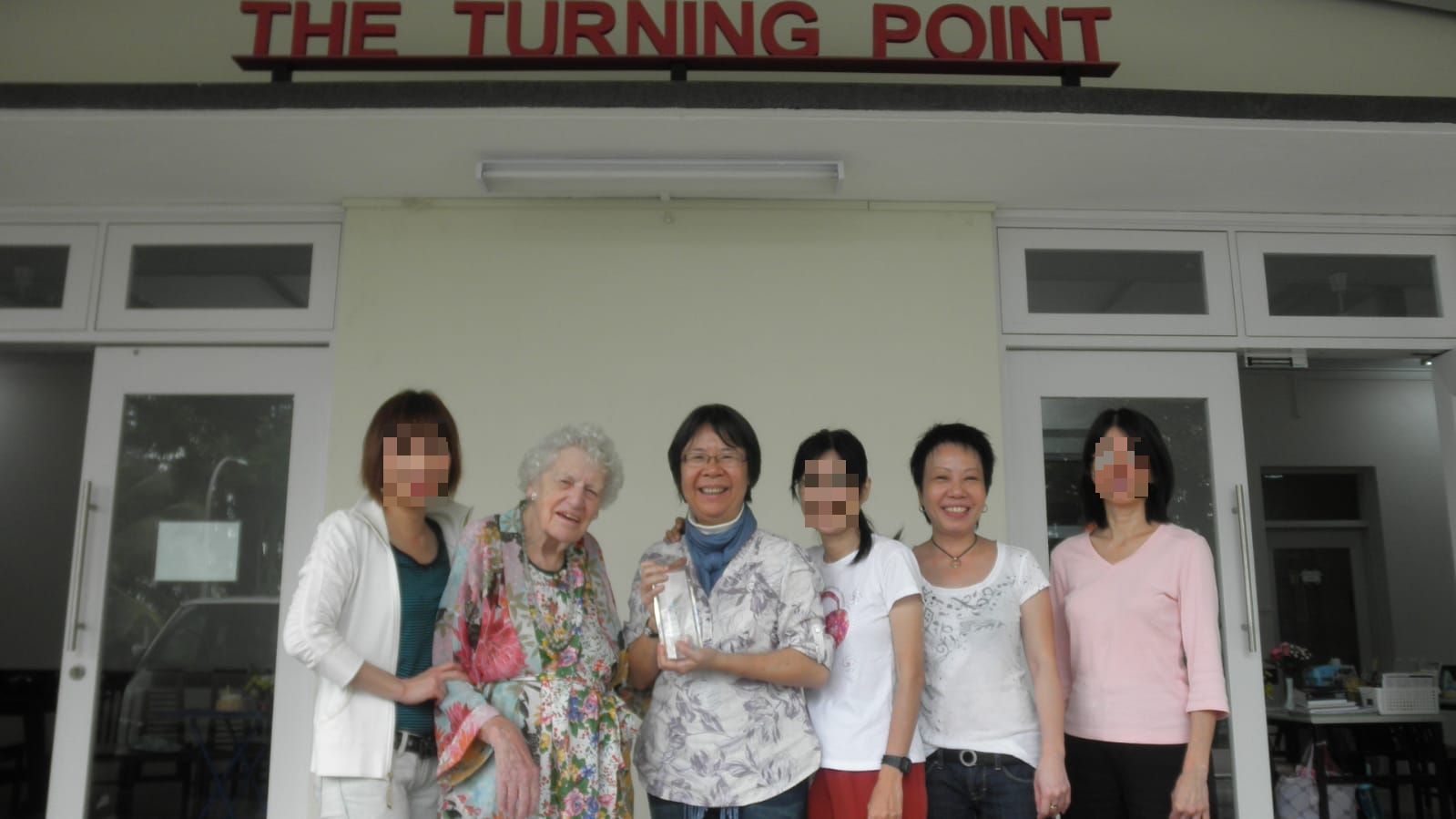
Violet Lim (second from right) experienced God’s love through the people she met at The Turning Point, was transformed and is now giving her life to serving others like her. She is pictured here with Ng (fourth from right) and the late Felicity Foster-Carter, who was the first DRC volunteer of the Prisons Department and also on the founding board of The Turning Point. Faces have been blurred to protect their identities.
Carol Wee, 40, another former resident, was also transformed by the warmth that she encountered in the home. “What they offered me was not a professional service. Rather, they offered me a relationship,” she said.
Even after she completed her programme, Ng and Khew continued to meet up with her regularly and stood by her as she dealt with challenges along the way, such as in her relationships and education.
“What they offered me was not a professional service. Rather, they offered me a relationship.”
“They were always there to cheer me on in the journey of life,” she said.
Wee is particularly close to Ng, whom she regards as her spiritual mother. “She was always ready to be with me in moments of crisis, be it in presence or providing practical help.”
She also distinctly remembers the time when Ng introduced her as “my young friend”, which touched her deeply.
“It showed me that she doesn’t regard me as a case that she has to solve, but as a friend. I think that really restored dignity and meaning to who I am.”
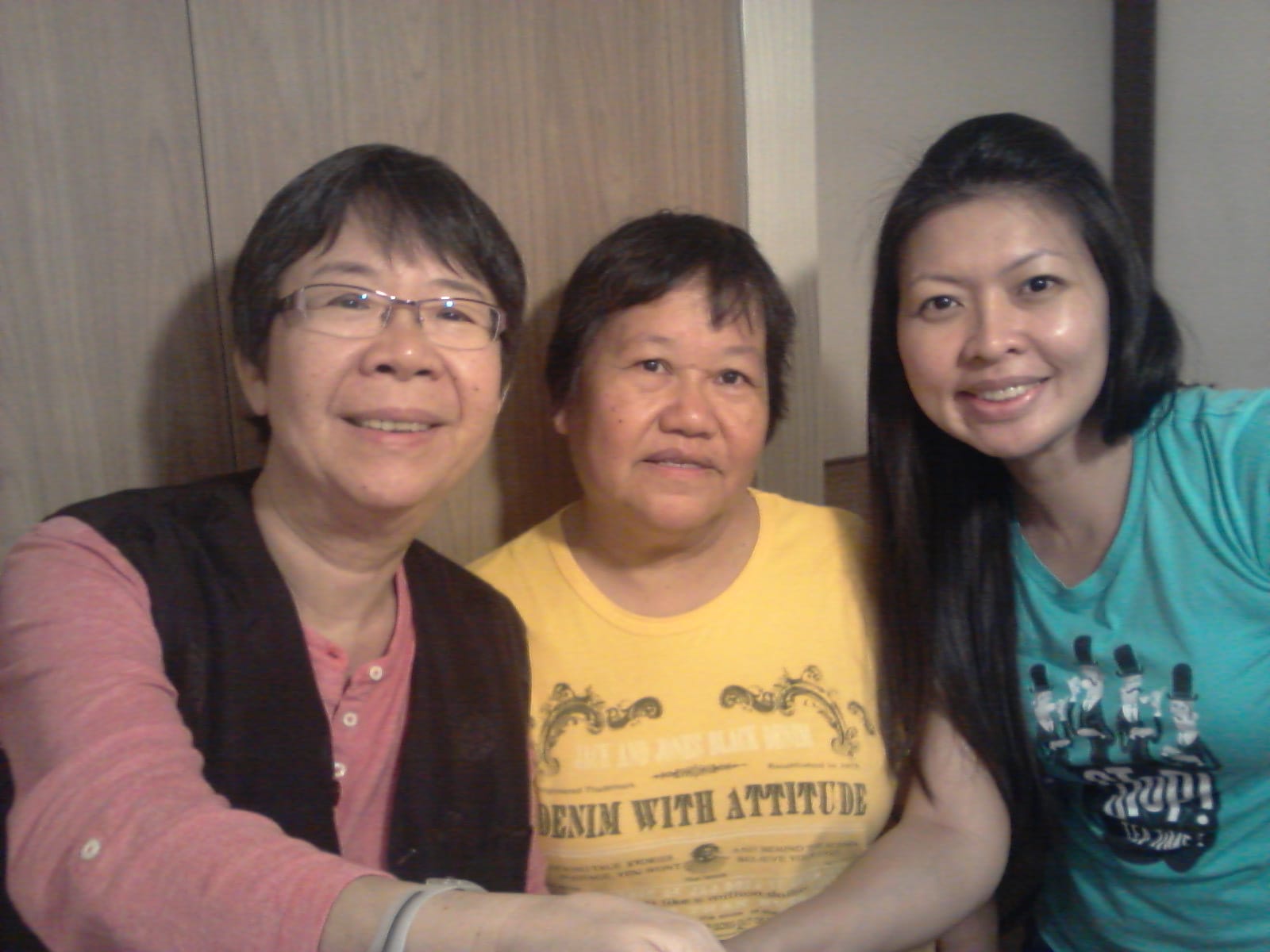
Ng (left) and Khew (middle) with Wee, who was transformed by the warmth and love that she experienced in the halfway house.
Today Wee is a board member of The Turning Point. She also uses her story to encourage others, and runs life skills and mentoring programmes at Singapore Girls Home and in prison.
These testimonies have brought immense encouragement to Ng, who said: “If there’s only one person that I’ve been able to help throughout my whole ministry, it is still worth it.”
Seeing the fruits of commitment
Even though both Ng and Khew have since retired and passed on the mantle to others, they have not stopped serving these women.
“Though I retired two years ago, I’ve never stopped my ministry,” said Khew.
“After they left, God was still chasing after them.”
Though some urged Ng to change her phone number to take a rest after two decades of service, she refused. “I was thinking, how to? It’s a calling, not a job,” she said.
Both Ng and Khew continue to volunteer at The Turning Point and are involved in aftercare meetings, which see them spending time with former residents over a meal and God’s Word.
These meetings are often crucial in letting the women know that there is someone who cares for them, even after they’ve left the programme.
“He never fails to show up when we cry out to Him.”
“It’s not what you say but who you are during and after the programme that convinces them of your genuineness,” said Ng, who speaks tenderly of these women and remembers them all by name.
Both remain in touch with the former residents, some of whom regard them endearingly as their mothers or godmothers. Ng even goes into prison once a month to visit some of these women, “because many of them are back there”, she said.
Once, when a former resident’s mother passed away, she called Ng up to inform her. “She said, Sister Florence, my mother just passed away and I thought of you, because you’ve been like a mother to me. I miss you and the time we spent together,” Ng recalled.
Both women, who are single, agreed that they only began to see the fruits of their labour after persevering for 20 years.
Ng said: “Especially during the aftercare meetings, we hear how God has helped them. Even though they weren’t serious during the programme, but after they left, God was still chasing after them.”
God of hope
Looking back on the past 30 years of The Turning Point’s history, Ng and Khew are convinced that it was all by the hand of God.
Ng said: “God always shows up when we pray. He may not show up in the way that we expect, but he never fails to show up when we cry out to Him. He’s always faithful.”
“Our work is anchored on God, who is our Jehovah Jireh, our provider and our bastion of hope.”
Khew is thankful for a new team of leaders who are now taking over the helm.
“In the past, no one wanted to do this type of work and it wasn’t easy to find employees. But now, there are people who want to do it, and they do it well too, so this is something I need to thank God for,” she said.
While the new team works to develop programmes and better ways to help these women to recover, the foundation of the work remains unchanged.
Coreen Chong, the current executive director of The Turning Point, said: “Our work is anchored on God, who is our Jehovah Jireh, our provider and our bastion of hope.
“Our prayer is that the women who come through the doors of The Turning Point will find and encounter God, and they will go out strengthened, knowing that our God of hope has for them a good future.”
“I was knocking on the door of hell”: Ex-supermodel finds freedom from a life of drugs and pain
We are an independent, non-profit organisation that relies on the generosity of our readers, such as yourself, to continue serving the kingdom. Every dollar donated goes directly back into our editorial coverage.
Would you consider partnering with us in our kingdom work by supporting us financially, either as a one-off donation, or a recurring pledge?
Support Salt&Light
